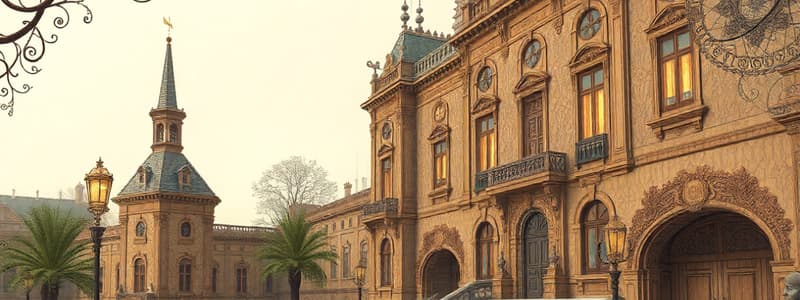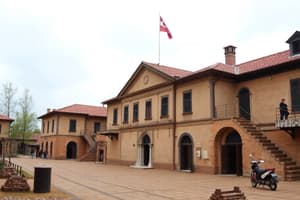Podcast
Questions and Answers
What is the primary focus of historical study?
What is the primary focus of historical study?
- Geological formations and their changes over time
- Future predictions based on current trends
- The study of the past, with a focus on human activities (correct)
- Analysis of literary works from various cultures
Which of the following best describes what historians do?
Which of the following best describes what historians do?
- Create fictional stories based on past events
- Predict future events using complex algorithms
- Analyze past events, investigate cause and effect, and construct narratives (correct)
- Focus solely on memorizing dates and names of important figures
What are historical sources?
What are historical sources?
- Modern textbooks that summarize historical events
- Future predictions made by historians
- Purely fictional stories with no basis in reality
- Materials used by historians to construct accounts of the past (correct)
What distinguishes a primary source from a secondary source?
What distinguishes a primary source from a secondary source?
Why do historians divide the past into eras and periods?
Why do historians divide the past into eras and periods?
Which period does ancient history typically cover?
Which period does ancient history typically cover?
What is medieval history often referred to as?
What is medieval history often referred to as?
Which of the following is a key development of modern history?
Which of the following is a key development of modern history?
What does social history primarily examine?
What does social history primarily examine?
What is 'causation' in the context of historical studies?
What is 'causation' in the context of historical studies?
Flashcards
What is history?
What is history?
The academic study of the past, focusing on human activities, events, and their causes and effects.
What is Historiography?
What is Historiography?
The study of how history is written, involving critical examination of sources and the influence of historians' perspectives.
Historical Sources
Historical Sources
Materials from the past used by historians to construct accounts, including primary sources (created during the time period) and secondary sources (created later).
Eras and Periodization
Eras and Periodization
Signup and view all the flashcards
Ancient History
Ancient History
Signup and view all the flashcards
Medieval History
Medieval History
Signup and view all the flashcards
Modern History
Modern History
Signup and view all the flashcards
Social History
Social History
Signup and view all the flashcards
Political History
Political History
Signup and view all the flashcards
Causation
Causation
Signup and view all the flashcards
Study Notes
- History is the study of the past, particularly focusing on human activities
- It is an academic discipline that uses a narrative to describe, examine, question, and analyze past events and investigate their patterns of cause and effect
- Historians seek knowledge of the past using historical sources such as written documents, oral accounts, art and material artifacts, and ecological markers
Historiography
- Historiography is the study of the methods and principles historians use to develop historical interpretations
- It involves critically examining sources, selecting relevant evidence, and constructing narratives that explain past events in a meaningful way
- Historiography also considers the influence of the historian's own perspective and biases on the interpretation of historical events
Historical Sources
- Historical sources are the materials from which historians construct their accounts of the past
- These sources can be primary, created during the time period being studied, or secondary, created after the event by someone who did not experience it firsthand
- Examples of primary sources include documents, artifacts, and eyewitness accounts
- Secondary sources include books, articles, and other analyses of historical events based on primary sources
Eras and Periodization
- Historians divide the past into eras and periods to organize and analyze historical events
- These divisions are often based on significant changes or turning points in history
- Common historical periods include ancient history, medieval history, and modern history, each with its own sub-periods
Ancient History
- Ancient history typically covers the period from the beginning of recorded human history to the end of the classical era
- Key civilizations include Mesopotamia, ancient Egypt, ancient Greece, and ancient Rome
- This period is marked by the development of agriculture, the rise of cities, the formation of states, and the creation of writing systems
Medieval History
- Medieval history, often called the Middle Ages, spans from the fall of the Roman Empire to the beginning of the Renaissance
- Key events and developments include the rise of Christianity, the expansion of Islam, the feudal system, the Crusades, and the growth of towns and cities
- Significant civilizations and empires include the Byzantine Empire, the Islamic Caliphates, and various European kingdoms
Modern History
- Modern history generally covers the period from the Renaissance to the present day
- Key developments include the Scientific Revolution, the Enlightenment, the Age of Exploration, the rise of nation-states, industrialization, and globalization
- This era is marked by significant social, political, and technological changes that have shaped the world we live in today
Approaches to Studying History
- Social history examines the experiences of ordinary people and social structures
- Political history focuses on the study of governments, political institutions, and political movements
- Cultural history explores the cultural practices, beliefs, and values of societies
- Economic history analyzes the economic systems, activities, and developments of the past
- Intellectual history examines the history of ideas and intellectual movements
Key Concepts in History
- Causation refers to the relationship between cause and effect in historical events
- Change and continuity examine how societies and cultures evolve over time while maintaining certain traditions
- Context refers to the social, political, and cultural environment in which historical events occur
- Perspective involves understanding different points of view and biases in historical sources and interpretations
- Significance refers to the importance or impact of historical events and developments
Studying That Suits You
Use AI to generate personalized quizzes and flashcards to suit your learning preferences.
Description
Explore history, its focus on human activities, and its role as an academic discipline. Learn about historiography, the study of historical interpretation methods. Understand the critical examination of sources and narrative construction.




